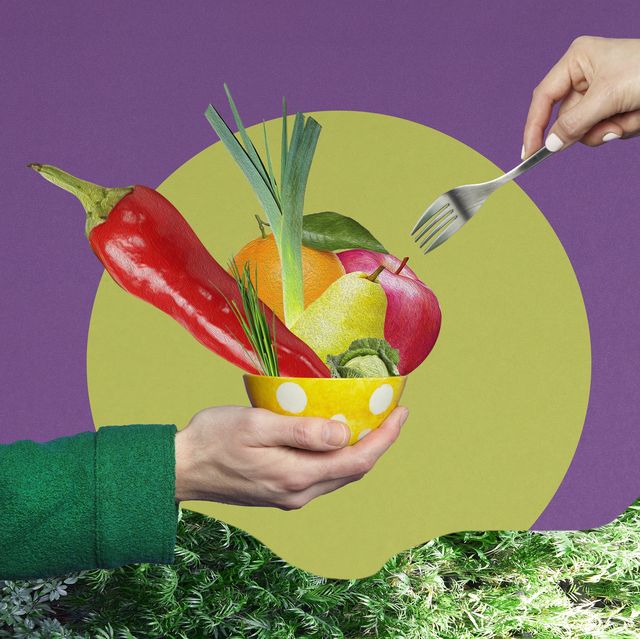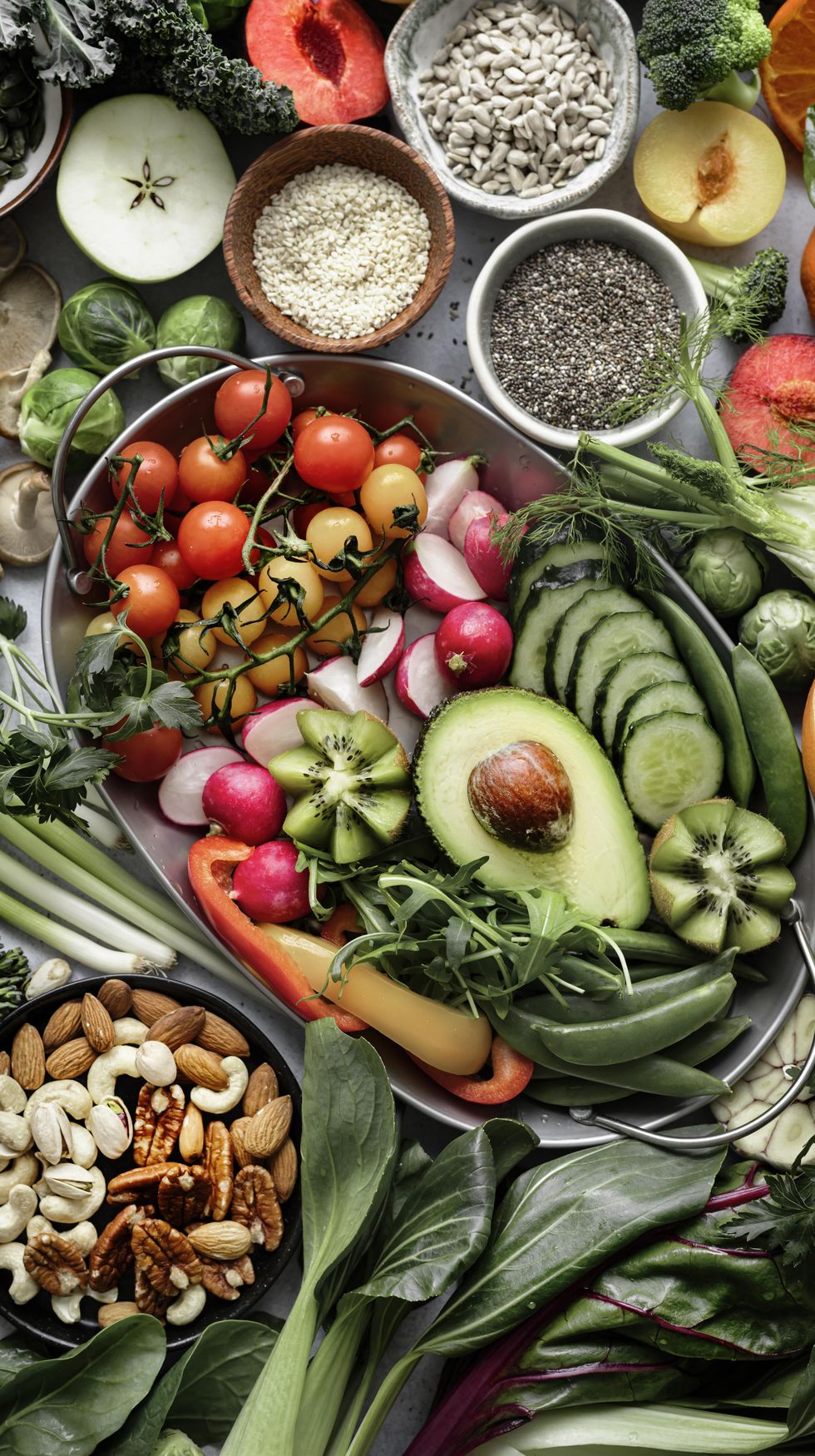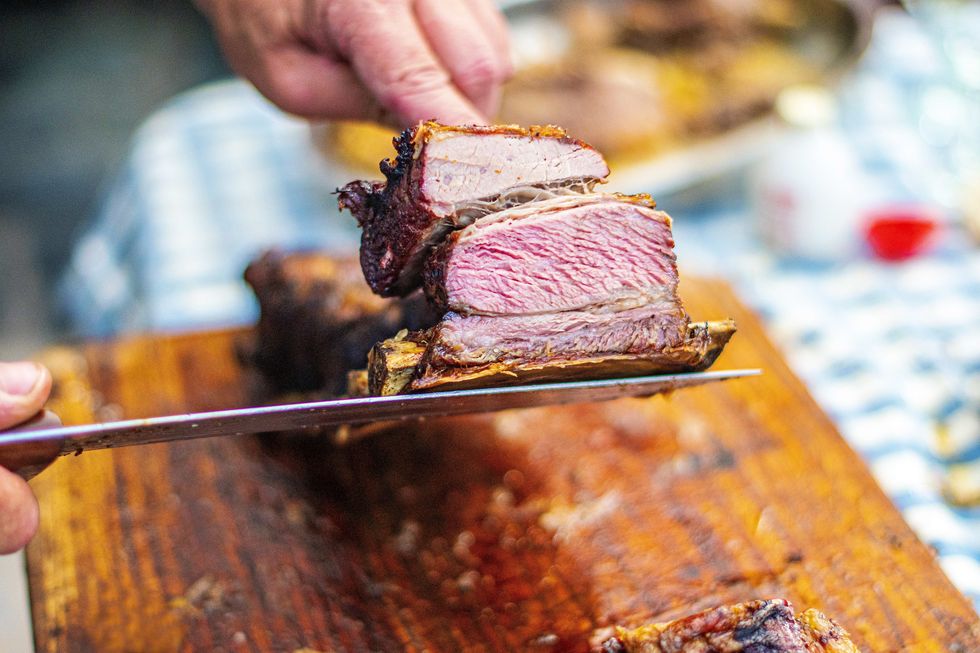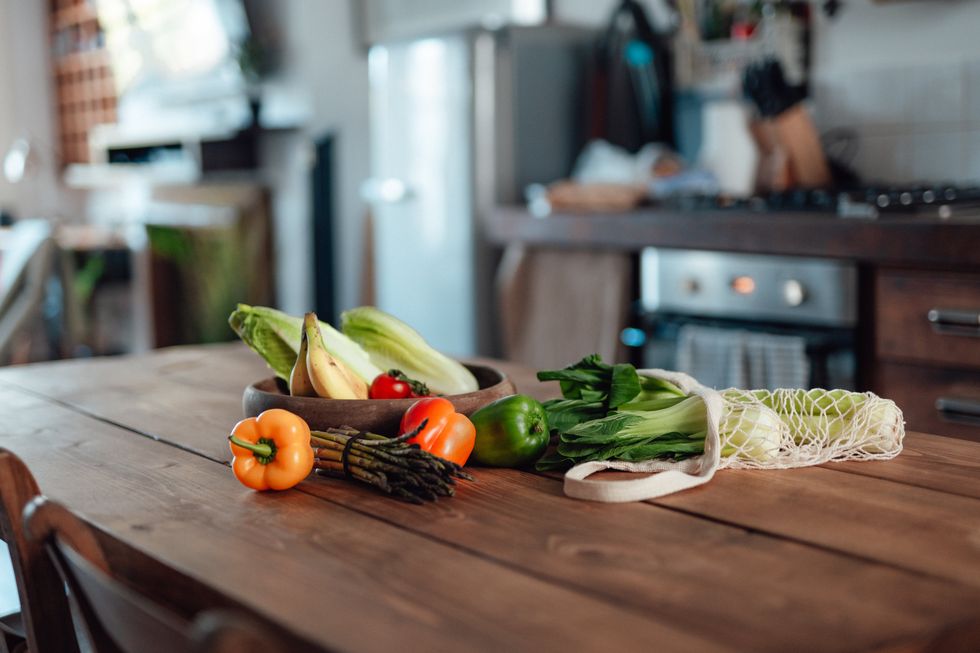Nutrition is a maddening business. Foods are in one day, compost the next. Vitamins that cured ills last week are promptly debunked. We all want to eat better, but who has the time to sift fact from fad?
Well, fortunately, we do. MH put a (very) long list of your most pressing nutritional queries to a panel of experts: nutrition and functional medicine specialist Steve Grant; leading clinical and sport dietitian Rick Miller; and Adam Collins, a senior tutor in nutrition and metabolism.
Then, we distilled their answers to compile the bite-sized Q&A below. Consider this is your easily digestible guide to getting healthy eating right.
Give it to me straight: which of my vices do I need to give up for good?
We’re talking strictly food-related, presumably?
Er… Let’s say yes. Or else that’s a whole other conversation.
Then, unless you have an allergy, a persistent medical condition, or adhere to a prohibitive religious doctrine, there’s nothing in particular you need to cut out.
As in… nothing?
Nothing. In fact, we’d caution against this kind of intervention. Variety and flexibility in your diet are crucial to maintaining a healthy relationship with food. More pertinently, eliminating specific foods can reduce your tolerance to them, making it hard to reintroduce them to your diet when the wind changes on the latest nutritional thinking.
Does that mean I should switch back to dairy? I still have two-thirds of a carton of Oatly in the fridge.
Well, you could argue that cow’s milk is more nutrient dense than plant milks, which tend to be fortified with extra vitamins and minerals. But, ultimately, they’re just different, with their own calorie counts and macro balances. It depends on what else you’re eating and which nutrients you might be short on.
So, I don’t need dairy, but I don’t have to give it up if I don’t want to?
Exactly. There are other ways to source your calcium: leafy greens, nuts and soya all work. In this case, environmental and ethical arguments for avoiding animal products might be more convincing.
Yes, I’ve seen that Netflix documentary. But eco props aside, is veganism any better for me? Or is it just a marketing ploy to sell cauliflower steaks?
Let’s be clear here: Bourbon biscuits are vegan. Greggs does vegan “sausage” rolls.
Stripping out animal products does not automatically make a meal healthier. Think in terms of additions, not eliminations: eat more vegetables and pulses or beans. A 10-year study from the University of Navarra in Spain found that omnivores who eat more plant-based foods and cut back on meat – going down to about 140g per day – almost halve their risk of obesity compared to those with more carnivorous appetites. It’s not a case of one or the other.
But what about the protein?
What about it?
I need more, right? That’s why everything is fortified with the stuff.
If you thought to ask, chances are you’re doing all right. Our protein needs vary according to our activity levels and body goals, but most men require something like 1g or 2g per kilo of their weight.
Can you give that to me in litres of protein shakes?
We wouldn’t recommend getting it all from shakes. Roughly speaking, you’d need about six protein bars a day for an 85kg man. Or, for a more balanced menu, a couple of fish fillets, five eggs, a block of tofu and a portion of rice. Though you’ll find protein in most things you eat, even veg.
Wait, rice? Did you mean quinoa? Isn’t that the one with all the protein?
Quinoa is a good source of essential amino acids, and it offers a good variety of vitamins and minerals. But so do many other wholegrains and seeds. Eat it, by all means, but don’t restrict yourself to it under the assumption that it’s superior.
It’s not a real superfood, then?
There are no set criteria for superfoods. They can’t be categorised by racking up their antioxidant concentration.
Nor the frequency with which they feature on Goop, presumably.
Quite. Plenty of the foods awarded arbitrary “super” status are very good for us when it comes to nutrient density – blueberries, leafy greens, wild salmon – but they don’t possess any special powers.
Not even coconut oil?
Nope. In fact, overdoing it can raise your “bad” cholesterol levels.
How about powdered charcoal?
We’d steer clear of that one.
Is there anything in Whole Foods that’s actually worth buying, then?
If budget allows, there is plenty of nutritional benefit to choosing organic vegetables, which often have a higher antioxidant content, and grass-fed meats, which have a better ratio of healthy fatty acids than meats from grain-fed animals. Just don’t be fooled by rebranded junk food: a £5 bag of kale crisps is still a bag of crisps.
I blend my kale into shakes. That must be good, because Joe Rogan does it.
Shakes and juices offer an easy way to squeeze more fruits and veg into your diet, but they can also be a very concentrated source of quickly absorbed calories and carbs. That can be a good thing or a bad thing, depending on what your goals are.
What if I want to lose weight?
Ensure those shakes contain satiating fibres and proteins, and view them as light meals, not drinks. Downing what equates to a banana milkshake alongside your regular breakfast could bump you into a caloric surplus.
Ah, but I never add any sugar. I sweeten mine with organic date syrup.
As far as your organs are concerned, that’s still sugar.
But… it’s made from fruit.
By that logic, you could argue that sugar cane is just a grass from south-east Asia. Sweeteners such as manuka honey, maple syrup, coconut sugar, and so on, might bring a few extra nutrients to the table, but there’s not a lot in it.
Surely they beat artificial sweeteners. I’ve heard they cause cancer.
In reality, research into the impact of artificial sweeteners on our health is still pretty limited.
Wait, that sounds ominous. I was joking about the cancer thing, you know?
Don’t lose sleep over it. Some animal studies have inferred a link between chemical sweeteners and the development of certain cancers, hence the headlines you’ve seen. But the dosages applied to create this effect are way beyond what humans consume.
Trust us: no one’s taking that many Diet Coke breaks. So, while we would personally limit sweeteners, the current research suggests that a normal amount of exposure is unlikely to be a major issue.
So, which foods will give me cancer?
Try not to think of it in those terms. Yes, some studies have correlated certain foods with an increased risk, but these figures are often manipulated or exaggerated by the media for shock value. Remember: correlation is not causation.
So, I can still eat red meat?
If you’d like, yes.
As many steaks and sausages as I want?
Hang on. An excessive intake of red meat has been linked to colon cancer, so best keep it to two meals a week (which falls within the NHS guidelines), while putting further limits on anything that has been cured or preserved when possible.
Because salt is bad?
It’s not as much about the salt as you think. In fact, the latest evidence suggests that a moderate salt intake might not be damaging for those with healthy blood pressure readings. The link is more likely to be caused by chemicals present in red meat itself, as well as nitrite preservatives. But there are a whole host of other factors at play in your chances of developing cancer – an inadequate intake of fibre and omega-3 fats, for example. Red meat is far from the lone gunman, and that goes for its links to heart disease, too. It’s one piece of the puzzle.
Still, that’s the “carnivore diet” crossed off my list. But what about this new ketogenic diet that everyone’s talking about? How does that work?
Essentially, you deplete your body’s stores of glucose, its preferred fuel, by eating mostly
fats instead. This tips your body into a state called ketosis, which mimics the effects of fasting. But it’s not new: it dates back to the 1920s, when doctors first developed it as a way to manage seizures for patients with epilepsy. Even so, keto is still best considered a selective therapeutic diet.
No, wait – you must be thinking of something else. I’m talking about the one A-listers use to get lean. Those UFC guys do it and maybe a Kardashian.
It’s one and the same. When your body runs out of glucose, it starts to burn its own fat for energy. In this way, the keto diet often leads to quick weight loss. However, it’s very difficult to sustain, and it can be hard to ensure you’re taking in enough fibre, vitamins and minerals, since you’re limiting your intake of fruits, vegetables and beans. It’s low on protein, too, which can impair muscle repair if you’re training hard.
I saw a recipe for keto bread rolls the other day. What’s that about?
Not the foggiest.
I think it was made with mulched nuts. Speaking of which, is bread still considered bad? The real kind, not the keto rolls.
Again, it depends on the context. If you need to refuel quickly – after intense exercise, say, or midway through a hike – there can be an argument for choosing foods that have a faster impact on your blood glucose levels, known as their “glycaemic load”.
Bread can scratch that itch. Generally speaking, however, it’s neither very beneficial nor particularly harmful. Keep in mind that nothing you eat can be viewed in isolation. Pairing those two slices with a filling based around healthy proteins and fats will slow the release
of glucose, keeping your energy steady. A chip butty will do the opposite.
But what if my chip butty is made from wholegrain bread and sweet potato fries? Those are “good carbs”, right?
Sweet potatoes are fairly nutrient dense, though less so when deep-fried, and wholegrain bread will have a gentler impact on your blood glucose. But it’s all about where they sit among the rest of your diet. Even good carbs, when eaten in large portions or without other foods, can lead to energy crashes.
Is that why I feel so tired after lunch?
Perhaps. Carbs don’t affect all of us in the same way. For example, you could split your sandwich with a friend…
No chance!
We’re speaking hypothetically here. The point is, if you each ate half of the exact same sandwich, it would affect your blood sugar in very different ways. This could be due to your body composition, recent exercise habits, your gut bacteria, or even your genetics. It’s sometimes called “carbohydrate tolerance”.
Oh, I don’t have a problem with that. If anything, I think I’m a little too tolerant of my carb habit.
Look, in short, carbs are good, but we all thrive with different amounts, so pay attention to your body’s signals. If you mostly choose low-glycaemic-load carbs, paired with protein-rich foods, and eat the bulk of them around training or on days when you’re particularly active, you’re probably on to a very good thing.
That all sounds a bit too simple.
The truth often is.
I still want to lose a little bit of weight, though. If I’m not cutting out carbs, how about intermittent fasting?
There is plenty of evidence to suggest that fasting can play an important role in health. A well-functioning body should be able to go without food for more than a few hours with relative ease. However, this is a skill we quickly lose without practice. If you want to give it a try, we’d recommend introducing it slowly. Gradually increase the gaps between meal times, eating dinner earlier and breakfast later. It’s not always easy, but it shouldn’t make you feel ill and lethargic.
Is fasting better than a detox?
How are you defining “detox”?
No meat, no booze, no sugar, that sort of thing. Raw vegetables for dinner.
You’ll always see benefits from cutting back on processed foods and alcohol, particularly if you’re also increasing your intake of phytonutrient-dense, high-fibre foods. That’s just common sense. But those benefits will be reversed once you revert to your former habits.
But isn’t it supposed to make my body less acidic? Though I’ve never been entirely sure what that means…
The theory is that certain foods, such as meat, refined sugar, dairy and caffeine, cause your body to produce acid. Ostensibly, this can then be counteracted by eating more alkaline foods, which tend to be mostly fruits and vegetables.
Does it work?
Not as advertised, no. Most of the diet’s benefits are sold on the idea that it will influence the pH of your blood, but blood pH is tightly regulated and minimally affected by what we eat. Any benefits you experience will come from – you guessed it – an increase
in your vegetable intake.
Raw veg pots are still the answer, then?
There’s no real reason to eat all of your vegetables raw. Cooking some foods can “unlock” their nutrients (as is the case with carrots and tomatoes) and reduce bloating (broccoli and other leafy greens). So, we’d advise a mixture of cooked and raw vegetables. Adding a little fat in the form of olive oil or even a drizzle of melted butter can also improve the absorption of certain vitamins. An undressed plate of lettuce and cucumber has minimal nutritional value. It’s mostly water. All it really offers to your health is a low calorie count.
Should I be counting calories? The whole concept feels a bit dated now. Isn’t there a better system?
Maintaining a calorie deficit – burning more energy than you’re taking in – is still a good basis for managing your weight and body composition, but it’s not an exact science. For example, it requires more energy to break down 100kcal of protein than it does 100kcal of carbs, so the net effects on your body aren’t equal. But the concept roughly holds true, yes.
What about negative-calorie foods?
I assume you’re talking about the theory that you burn more calories digesting some foods than you absorb from them? Regrettably, this is a myth. Even a piece of celery will provide more calories than you’ll expend chewing on it, unless you have some fairly weird eating habits. Stick to using it as a houmous spoon.
What about green tea? That burns calories, doesn’t it?
Barely – presuming you’re not ingesting it in pharmacological doses.
In that case, I’ll stick to coffee. I can still drink coffee, right? It’s hard to remember whether it’s considered good or bad these days.
How much are you drinking?
Two cups a day. OK, maybe three or four if I’m hungover, or it’s a Monday.
We all metabolise caffeine at different rates. Those who metabolise caffeine very slowly are more likely to experience issues such as heart palpitations, sleeplessness and anxiety, so if that rings true, you might want to keep tabs on your intake.
However, in most people, three to four cups a day are linked to a lower risk of diabetes, depression and liver damage. As long as those cups you’re sinking aren’t quadruple-shot grandes, you’re probably doing yourself some good.
And I don’t need to put grass-fed butter or turmeric syrup in it?
Absolutely not.
Final question, and this is the big one: I can still drink booze, right?
You can, but would you listen if we told you to stay within your 14-unit weekly limit?
I’d, erm, certainly try to…
Then consider this: take two consecutive days off each week, never free-pour your spirits, avoid using sugary mixers – and always, always eat a proper dinner. That last prescription, at least, shouldn’t be too tough to stomach.

Scarlett Wrench is the Senior Editor at Men’s Health UK.
With more than 12 years’ experience as a health and lifestyle editor, Scarlett has a keen interest in new science, emerging trends, mental well-being, and food and nutrition. For Men’s Health, she has carried out extensive research into areas such as wellness in the workplace, male body image, the paradoxes of modern masculinity, and mental health among school-age boys.
Her words have also appeared in Women’s Health, Runner’s World and The Sunday Times.
















